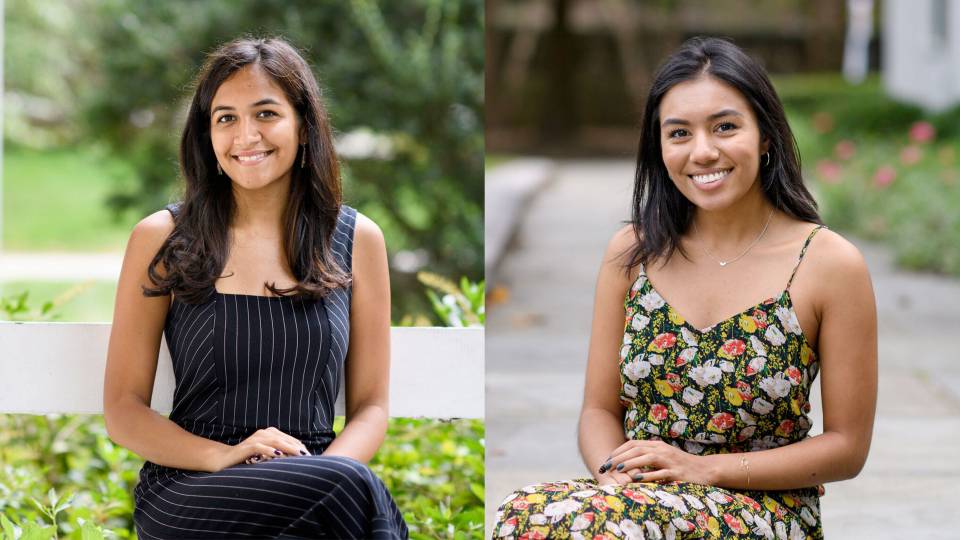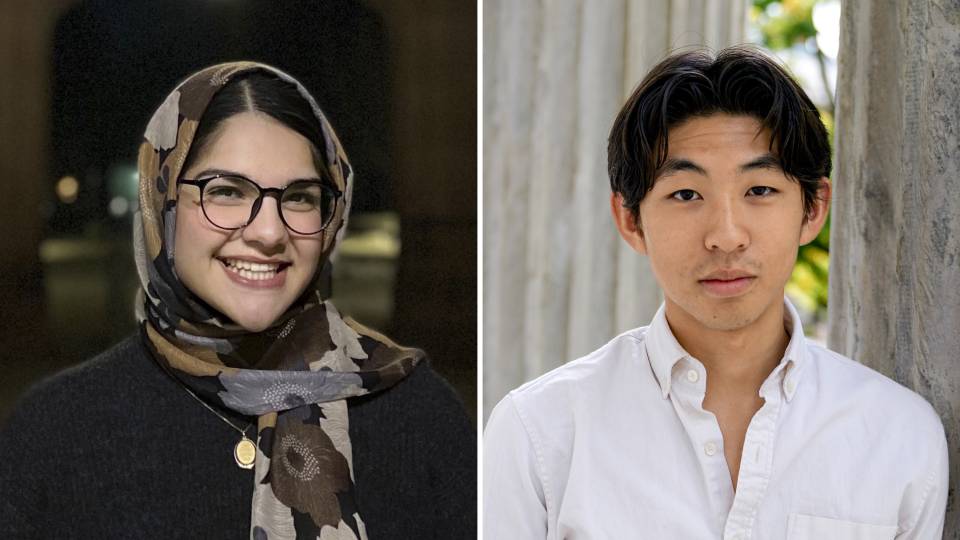Princeton University senior Marie-Rose Sheinerman has been awarded a Rhodes Scholarship for graduate study at the University of Oxford.

Sheinerman is among 32 American recipients of the prestigious fellowships, which fund two to three years of graduate study at Oxford. In a statement, Elliot Gerson, American Secretary of the Rhodes Trust, said of this year’s Rhodes Scholars representing the United States, “They inspire us already with their accomplishments, but even more by their values-based leadership and selfless ambitions to improve their communities and the world.”
Sheinerman will join an international group of Rhodes Scholars chosen from more than 60 countries. Individual countries announce their recipients on different schedules.
She will begin her studies at Oxford in October.
Sheinerman, of New York City, is concentrating in history and is also pursuing a certificate in Russian, East European and Eurasian studies. At Oxford, she will pursue an MPhil in history. She is a member of Whitman College.
While an intern at The Miami Herald in summer 2021, Sheinerman was part of the team of reporters awarded the 2022 Pulitzer Prize for Breaking News Reporting for “urgent yet sweeping coverage” of the Champlain Towers South condominium collapse in Surfside, Florida. She led a byline on a key story in the Pulitzer entry and contributed to other stories included in the winning package.
She has served as the editor in chief of The Daily Princetonian since January, where she manages a staff of more than 300 students. In this leadership role, she has helped to spearhead equity initiatives including a financial stipend for lower-income staffers, pre-professional mentorship programs, and special issues that hope to build trust with marginalized communities among the paper’s readership.
She is a member of the Behrman Undergraduate Society of Fellows, a group of juniors and seniors who are committed to the study of humanistic inquiry, and previously served as a student board member of the Center for Jewish Life at Princeton.
In her academic work, her independent research has combined her passions for history and journalism.
In fall 2021, she took the junior seminar “The Ghetto,” taught by Yaacob Dweck, professor of history and the Program in Judaic Studies. “She wrote a brilliant research paper on one of the few Jewish women from the pre-modern period whose writings survive, Sara Coppia Sullam (1592–1641),” Dweck said. “Through an analysis of Sullam's correspondence with Ansaldo Cebá, a priest in the neighboring city of Padua, Marie-Rose demonstrated that Sullam's relationship with Cebá was fraught with conversionary pressure even as it was based on mutual intellectual admiration.”
Sheinerman, who is fluent in Russian, said her senior thesis — tentatively titled "Louis Fischer, Walter Duranty, and Gareth Jones: Case Studies of American and British Journalism on the Ukrainian Famine, 1932-1933" — analyzes “the reporting of three of the most prominent journalists who worked as foreign correspondents in the Soviet Union in the early 1930s — looking into how their disparate methods led to their failures and successes in telling the story of the famine.”
Dweck, her senior thesis adviser, lauded her scholarship and dedication to the field of journalism.
“Marie-Rose is a passionate advocate for social justice, and she is just as passionate an advocate of getting the facts right,” he said. “She has the potential to be a journalist of the caliber of Gail Collins or Jodi Kantor, someone whose reporting and opinion writing can and will shape the public sphere in the coming decades.”
“Everywhere one looks in the United States, local newspapers are closing, media outlets are being swallowed by large multi-nationals, and, if one picks one's head up and looks further afield, journalist are under attack, whether rhetorically or actually,” he said. “The world is in desperate need of excellent journalists who do not rush to judgment, who assess and evaluate before issuing a pronouncement, and who are not afraid to go to great lengths to get an answer to a difficult question. Marie-Rose has all the makings of an extraordinary journalist.”
In her Rhodes application, Sheinerman captured the blur of the first 24 hours of coverage of the Surfside collapse — when she was filing stories from her phone while crouching on the pavement, working side-by-side with national reporters such as CNN’s Wolf Blitzer — and how her editor set her on a different tack:
“With the tragedy unfolding in our backyard, the Herald could tell the stories a national reporter dropping in now wouldn’t think to. With a prominent Orthodox synagogue just six blocks north of the collapse, the victims had been disproportionately Jewish. Amid unfathomable grief, the community was still preparing for the Sabbath.”
That story, which focused on synagogue members who were supporting families with everything from boxes of candles and challah to guidance on planning burials in accordance with Jewish law, was published before sundown. In her Rhodes application, Sheinerman wrote: “Perhaps humanity’s greatest need are stories — crucially, ones crafted by members of the communities they depict.”
Joe Stephens, lecturer in the Council of the Humanities and Freshman Seminars, Ferris Professor of Journalism in Residence and director of the Program in Journalism, said of Sheinerman’s Rhodes award, “You could hear me shouting in excitement from the other side of campus. Marie-Rose is a rare talent and a brilliant and wonderful person.”
He continued: “Perhaps the most impressive thing about Marie-Rose is that, despite all her accomplishments at such a young age, she shows no sign of letting this massive success go to her head. She is humble and smart about seeking out counsel. She has worked hard to share her success and create community among her peers on campus. Under her leadership, The Daily Princetonian has grown into a vibrant must-read for everyone at Princeton. She has moved the newspaper decisively into the digital age. The Rhodes is just further testament that we will be hearing about her for many years to come.”
Sheinerman’s international experience during her time at Princeton includes an editorial internship at The Bubble in Buenos Aires, in summer 2019, through Princeton’s International Internship Program.
In addition to her internship at The Miami Herald — funded with support from a Ferris Summer Grant for Student Internships in Journalism, she completed internships at Bloomberg News in summer 2022 and The Jewish Daily Forward (remote) in spring 2021 and was a journalism fellow (remote) for Tablet Magazine in fall 2020. In summer 2020, she was named an Oscar S. Straus II Fellow in Criminal Justice by the Guggenheim Foundation and awarded funding for a remote internship at the Correctional Association of New York, a non-profit dedicated to data-driven oversight and reform of New York’s prisons.
In addition to the Pulitzer, Sheinerman’s reporting has received awards and been recognized as a finalist from Investigative Reporters and Editors, Religion News Association and the New Jersey Press Foundation.
This is the third year American Rhodes Scholars were elected entirely virtually, with all candidates and selectors participating digitally.
Sheinerman was in the Lewis Library when she received the news over Zoom from her district committee: Upon learning she had won the Rhodes Scholarship, she said: “I called my mom and started crying. I could barely speak or breathe, I felt so overwhelmed. I still feel so overwhelmed. I am so, so grateful for the many, many, many people whose mentorship and belief in me made this insane thing possible. The last thing in the world that this is, is my achievement alone: this belongs to my parents, my grandparents, my friends, my professional and academic mentors, and dozens of people whose stories have touched my life.”
About going to Oxford, she said: “I am so excited at the opportunity to learn not only from the faculty at Oxford, but maybe more importantly from my peers, including fellow Rhodes Scholars. Some of my deepest and most significant learning during my time at Princeton — academically, journalistically and personally — has been through conversations and friendships with my peers.”
After the Rhodes Scholarship, she intends to work as a journalist. “What exactly that may look like, I can't say for sure, but I know ultimately that my passion lies in journalism and that I hope to work as a reporter, perhaps eventually even as a foreign correspondent.”






